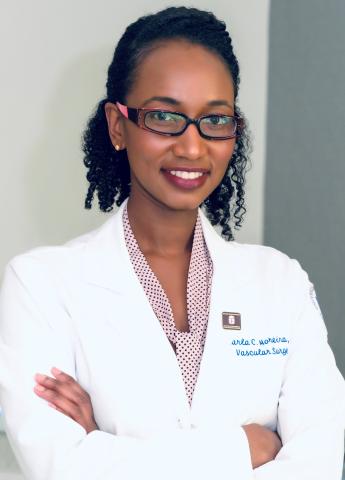
As I reflect on what it means to be a Black Vascular Surgeon during Black History Month, I can’t help but think about the fact that estimates from national and regional vascular surgery societal reports indicate that less than 2% of practicing vascular surgeons are Black. That I count myself among this very small, yet distinguished, group evokes feelings of humility, honor, and great responsibility.
As a Black woman and first-generation immigrant from Cape Verde, I dreamt of being of service to my family and my community. Vascular Surgery has given me the tools to positively impact the lives of patients from all walks of life. However, the sometimes-fraught reality of being a member of a minority class cannot, and should not, be ignored. In a nation where Black Americans make up 13% of the general population, we are underrepresented across all medical fields, but often overrepresented among the communities with highest burden of chronic diseases and those with the poorest outcomes. This is especially true among patients with vascular disease. The reasons for these diversity gaps and health care disparities are as varied and complex as the pathology of diseases that vascular surgeons treat. In order to move forward, we must acknowledge and address the role that racism, discrimination, and historical injustices have played in shaping our current circumstances.
It is not enough to call out the problems. We must be part of the solution. The work of building an inclusive and equitable vascular surgery workforce, that is able to provide high quality care to all patients, regardless of their race, ethnicity, gender, socioeconomic status, identity, etc., is part of our professional duty. It is the responsibility of every Vascular Surgeon to advance Black Health and Wellness, to lessen the impact of chronic vascular diseases on Black communities. One way to achieve this goal, is to cultivate a welcoming training and learning environment that will attract talented and diverse individuals from historically underrepresented groups to join the ranks of this wonderful profession.
The good news is that I believe most of us are engaged and we are doing this type of work every day in how we approach our clinical practice, teaching, and research roles. I have seen it! I have been the beneficiary of the intentional efforts being put forth at all levels of vascular societies and organizations to address issues related to diversity, representation, and health equity. I’m blessed to count among my mentors, sponsors, and allies Drs. Vincent Rowe, Donna Mendes, Robert Patterson, Edwin Kendrick, Chelsea Dorsey, Alik Farber, Rana Afifi, and many others. Indeed, sustained efforts are needed to expand pipeline programing and community outreach efforts. Female and minority trainees and young attending need structured mentorship and sponsorship opportunities with improved access to career development and leadership roles. Our patients need culturally competent vascular surgeons that look, speak, and relate to them in authentic ways. Black and underserved communities need resources and support to identify and minimize the burden of preventable diseases before they become endemic. This is our wheelhouse…this is #comprehensivevascularsurgerycare!
Yes, being part of the less than 2% of vascular surgeon who identifies as Black is an honor and a privilege. Mostly, however, it’s a responsibility to never forget the blood, sweat, and tears that was shed by the trailblazers before me. As we celebrate Black History Month, let’s celebrate Dr. Donna Mendes. In 1986, Dr. Mendes became the first board-certified Black female Vascular Surgeon. She paved the way for a generation of Black female surgeons to find a home in Vascular Surgery. She embodies everything that is dynamic and transformational about Vascular Surgery. Thank you, Dr. Mendes! Thank you, all future vascular surgeons!